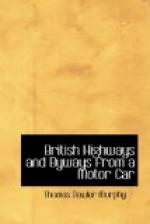to remember how many run-aways and smash-ups were
caused by the fractious horses they met on the short
journey. Visions of damage suits haunted him for
months thereafter. In our meanderings through
the London streets, the fears for the other fellow
which had harassed him during his former experience,
were speedily transferred to himself. To his
excited imagination, we time and again escaped complete
wreck and annihilation by a mere hair’s breadth.
The route which we had taken, I learned afterwards,
was one of the worst for motoring in all London.
The streets were narrow and crooked and were packed
with traffic of all kinds. Tram cars often ran
along the middle of the street, with barely room for
a vehicle to pass on either side. The huge motor
busses came tearing towards us in a manner most trying
to novices, and it seemed, time after time, that the
dexterity of the drivers of these big machines was
all that saved our car from being wrecked. We
obtained only the merest glimpse of Hampton Palace,
and the time which we had consumed made it apparent
that if we expected to reach our hotel that night,
we must immediately retrace our way through the wild
confusion we had just passed. It began to rain,
and added to the numerous other dangers that seemed
to confront us was that of “skidding”
on the slippery streets. When we finally reached
our garage, I found that in covering less than twenty-five
miles, we had consumed about four hours and we had
been moving all the time. The nervous strain was
a severe one and I forthwith abandoned any plan that
I had of attempting to do London by motor car.
With more knowledge and experience I would have done
better, but a local motorist, thoroughly acquainted
with London, told me that he wouldn’t care to
undertake the Hampton Court trip by the route which
we had traveled.
On Saturday afternoons and Sundays, the motorist may
practically have freedom of the city. He will
find the streets deserted everywhere. The heavy
traffic has all ceased and the number of cabs and motor
busses is only a fraction of what it would be on business
days. He will meet comparatively few motors in
the city on Sunday, even though the day be fine, such
as would throng the streets of Chicago or New York
with cars. The Englishman who goes for a drive
is attracted from the city by the many fine roads
which lead in every direction to pleasure resorts.
One of the most popular runs with Londoners is the
fifty miles to Brighton, directly southward, and the
number of motors passing over this highway on fine
Sundays is astonishing. I noted a report in the
papers that on a certain Sunday afternoon no less
than two hundred cars passed a police trap, and of
these, thirty-five were summoned before the magistrates
for breaking the speed limit. To the average
American, this run to Brighton would not be at all
attractive compared with many other roads leading
out of London, on which one would scarcely meet a motor
car during the day and would be in no danger from
the machinations of the police. Of course the
places frequented by tourists are often closed on Sunday—or
at least partially so, as in the case of Windsor Castle,
where one is admitted to the grounds and court, but
the state apartments, etc., are not shown.
Even the churches are closed to Sunday visitors except
during the regular services.




